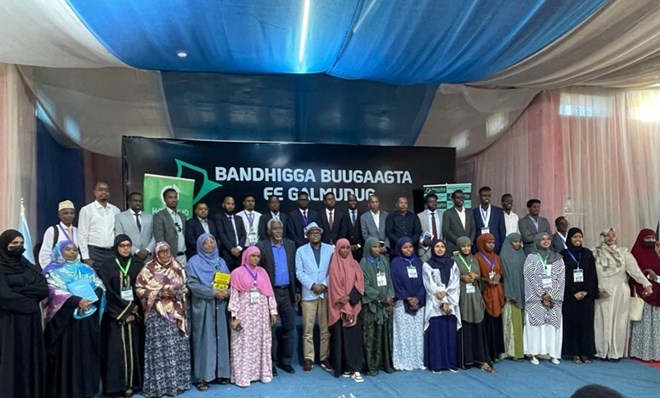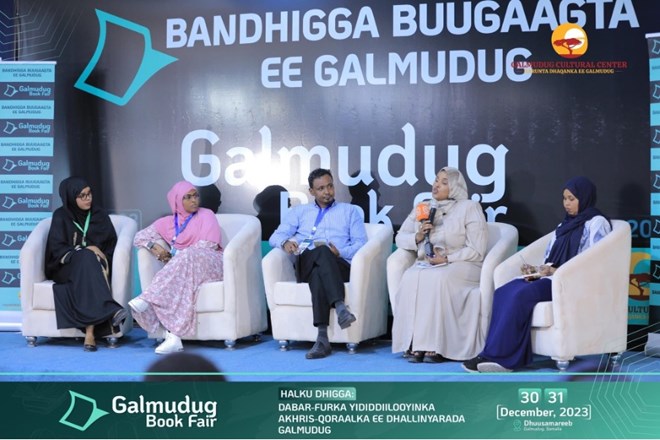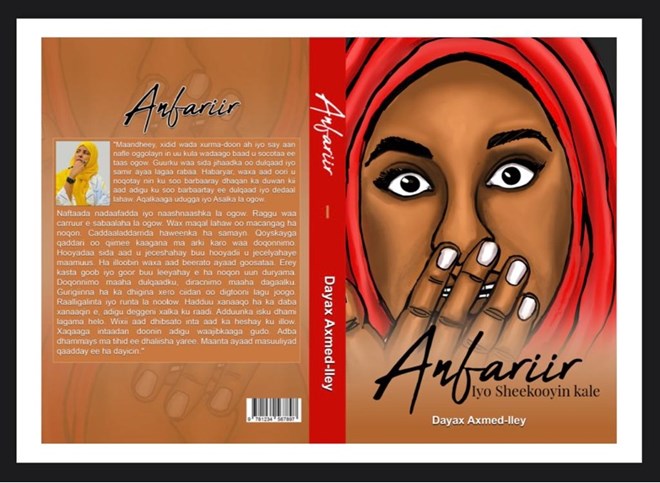By Dr Yusuf Sheikh Omar
07, January, 2024

We finally landed around 1pm on Friday 29th December 2023 to be received with a scorching temperature of over 30°C; the heatwave was at its peak. We soon disembarked and a long line of well-dressed welcomers gave us hugs and handshakes and accompanied us to lined-up vehicles. Within minutes, we arrived at a green village named Capital in a semi-arid land. The flora and fauna seemed being have grown naturally but were planted. Environmental care was evident in the era of Somalia’s climate catastrophe that entailed an enormous displacement. Alhamdulillah (Thanks to Allah) was a common phrase voiced by many.
In the village, there is a traditionally built hall decorated with Falko, made out of a specific grass known as Mayr. Beautifully interlaced, the Falko handcraft symbolizes the innovation and imagination of Somali women nomads. The hall was furnished with a mixture of fadhi carbeet (Arab sofa) and Somali darin (traditional mats). Dhusamareb communities often flock there to organize their ceremonies and celebrations. The Falko shade provided a sense of peace and serenity. We were served with cad iyo caano (meat & milk) the most favored Somali cuisine. The dish was provided by a chef group called Dhaqansame (Culturally right). The entire stage showcased cultural beauty, and Somali hospitality together with business and profit-making. “Galmudug waa guri gobeed” (Galmudug is the house for nobles) uttered one of the guests.
THIS IS FALKO
A friend of mine, Mohamed Mukhtar, who is the founder and managing director of Galmudug Cultural Center that organized the book fair, invited me some time ago. “Yusuf, I know you value the constructive role of education and Somali culture in peacebuilding. Ours will attract the best people in this field. Please join us and contribute” Mohamed insisted. “Insha’allah” (if Allah wishes) I responded. The opening ceremony started the following morning.
“This is 'hayaan waxbarasho' (an educational journey) book fair endorsed by the Ministry of Education” said the event MC. “You know, books bridge societies. They bring new ideas, innovation, intellectual growth, emotional entertainment, etc.” recounted another speaker. In his closing remarks, the President of Galmudug Axmed Cabdi Kaariye (dubbed Qoorqoor) revealed that in the past four years, the education enrolment in Galmudug has multiplied four times with an increase of 20 thousand students per year. It is still small and not enough, considering the prevalence of illiteracy, yet it is a big jump compared to Galmudug’s limited resources. Earlier, some students complained about the scarcity of free education and learning resources such as libraries. For students, laptops were an elusive mirage. During his remarks, the president ordered his assistants to buy 200 books from the book fair to encourage emerging writers and supply them to the nascent, fledging community reading and writing clubs together with a cultural rehabilitation centre. “My government also decided to hold Galmudug’s annual cultural week” declared the president. The audience applauded.
Another issue debated heavily was the importance of studying in the Somali language. Professor Mahadallah, the former Rector of Somali National University, demonstrated that mastering the mother tongue eases mastering a second and third language. It helps students think about ideas and abstracts, not words. The Professor continued emphasizing that the native tongue constitutes societal memory. It carries the culture, lifestyle, identity, and worldview of that particular society. Sadly, that is not the case in the Somali language. English and Arabic have displaced the Somali language. Another prominent person who was less enthusiastic about learning in Somali at this time argued that being educated only in Somali means you are unemployable. Most jobs are taken by English or Arabic-speaking people. The division was obvious in the discussion. History and human sciences teach us that when people lose their identity, roots, and cultural certainties, they lose their self-esteem and confidence. As a result, they become as vulnerable as a tree with damaged roots swaying in the wind and spiraling down into chaos and confusion ending up in a violent conflict.

One of the most interesting questions that appealed to many, was if the Ministry of Education has any policies for people with special needs education? “That is a great question. Somalis are getting matured” recounted a participant sitting on my right side. Another important aspect disclosed by the Galmudug Ministry of Education was a learning program that is underway and designed for pastoralists.
“To address the pervasive illiteracy problems Galmudug has endured for decades due to the protracted social unrest and the civil war, the Ministry of Education has piloted in late 2023 an ambitious learning program through which school-age children, including those in the rural areas, will benefit. The initiative will consider suitable ways to the rural and nomadic lifestyles. As the Somali wisdom goes Aqoon la’aani waa iftiin la’aan (Lack of knowledge is a lack of enlightenment). The Ministry of Education believes that education is the key to a peaceful and prosperous Galmudug State” stated Mohamed Mohamud Elmi, the Deputy of the Ministry of Education, Culture and Higher Education of Galmudug.
One of the participants’ favored sessions that was discussed, was how to develop an appropriate educational program for the nomadic life that can promote peace and stability. That said, nomads across Somalia are inflicted with the culture of violence aaro (vendetta), in which local peace practitioners resemble infectious diseases. Talo Wadaag, a community consultation program that I am part of, can facilitate conciliatory training programs to address Galmudug’s brewing and prolonged violent conflicts, including the rural areas, I shared this information with a few participants in a sideline chat and everyone nodded their heads and gave a thumbs up approvingly.
Somalis cannot talk about education without putting women in a prominent position. The MC narrated a widely used Somali catchphrase “Hooyadu waa dugsiga kowaad” (mother is the first school) that mirrors a globally utilized African wisdom “To educate a woman means to educate a society, but to educate a man means to educate an individual”. There is no dispute about the huge impact of Somali women on cherishing the young generation yet women’s representation in teaching positions, even in primary school is very scant. Nationally, with the exception of Puntland, women have recently been given around 10 percent out of 2600 teachers. “In Galmudug, a tiny portion of around 9% out of 400 teachers was allocated for women” commented Muna Ali Abdilahi, Gender Expert Consultant for Somali Education for Human Capital Project at MoECHE, Federal Level. Illiteracy is not confined to children. To help those who lost their schooling in their childhood, Galmudug has revived a Seeraare Program (an evening-based adult education) and also handcraft courses mainly benefited by women. In Somalia, handcraft is a creative traditional skill mastered by women. “You know, the first two top achievers at Somali national secondary exams were girls (Deeqa Maxamed Cabdullahi and Faduma Cbdullahi Axmed). If given an opportunity, girls outperform boys” contested Nimca Omar Samatar, an Officer of Public Schools Department, from Galmudug’s Ministry of Education. Another participant joined the chorus saying “Even our girls in the diaspora outstrip boys' educational performance and politics. Ilhan Omar, the congresswoman is a living example”.
Feeling that the audience was bored, a young woman novelist on the podium joked “Dumarku jeebka ragga ayey shaxaadaan, raguna jirka dumarka” (Women are attracted to men’s wallet while men are attracted to women’s body). The audience reacted with laughter and clapping as a sign of confirmation. “This is real. Not a community grapevine” whispered a female to my ears. The young novelist continued “If a woman publishes even a bestselling book, Somali men ask ‘What does she look like? Is she beautiful? Is she married instead of engaging with her ideas and intellectual competency? ’”. This reminisced me of a similar account found by Dr Safia Abubakar Farole who wrote a well-received report for TW’s Heritage Institute for Policy Studies. In her paper, a woman in Mogadishu stated something like “Jaamacad naageed jiko ayaa u danbaysa” (a woman’s degree will end up in the kitchen).

In conclusion, the book fair was beautiful and beneficial to everyone, yet some areas required improvements. Many participants I met voiced that very few writers were being invited. The expectation was to invite many. “We need more young writers, particularly women, in such events. You know why? Women are more connected to the wider society and their writings truly mirror communities' needs, stories, and everyday life experiences” argued a young man.
Dr Yusuf Sheikh Omar is the Director, Talo Wadaag 2 Programme, Heritage Institute for Policy Studies (HIPS)
https://heritageinstitute.org/
Twitter @yyididiilo